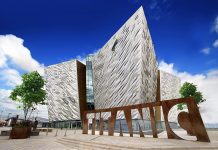01.12.15

After a 7.0 earthquake struck Haiti in January 2010, it caused widespread damage—leaving a reported 200,000 dead and 1.5 million homeless, not to mention costly physical destruction. An influx of aid and NGO organizations, along with nearly $4 billion from the U.S., came in for support, but reports of slow progress and recovery plagued the country for several years. But today, on the fifth anniversary of the earthquake, Haiti has transitioned from a post-disaster state to one supporting long-term planning and growth.
The U.S. State Department reports that 90 percent of residents who had been displaced in tent camps now have more permanent housing. Trash and debris from the disaster have been cleared. Job growth and a country-wide campaign promoting tourism, from beautification projects to new flight options to new resorts, is designed to lure visitors and boost economic independence (we included the destination in our Best Places to Travel in 2015 story).
One project, the Marriott Port-au-Prince Hotel, opens February 24 and stands out for the innovative ways it works with the surrounding community.
“It’s a giant corporate social responsibility project,” says Peter Antinoph, the general manager. “We’re looking to see how much we can support the society around our hotel.”

Born out of a partnership between top Marriott executives, the Clinton Foundation in Haiti and the phone network provider Digicel Group, the 174-room property in the Turgeau area has not only created jobs for local residents, but opportunities for native businesses, too.
“The hotel itself sources everything as local as we can,” Antinoph says, noting that soap in the guest rooms is made by a small women’s business in Haiti. In the onsite restaurant, the chicken comes from a farm in the mountains outside of Port-au-Prince, and tilapia hails from a nearby fish farm. While most Marriott properties sport a Starbucks through a company partnership, this one features Haiti’s own Rebo brand. An essential oil the hotel contracted to use created 25,000 jobs for farmers to produce it, Antinoph says.

When hiring the hotel staff, priority was given to Haitians in need of work over past experience or skill set. “It’s a teaching hotel, and we want to support the community and give people the ability to reconstruct their lives,” Antinoph says. “We know it will be a huge learning curve, but the idea is to instill a lifeline here that isn’t just a handout.”
Extra showers and facilities were built for the staff, many of whom don’t have running water in their own homes. It isn’t uncommon for Haitians to struggle for a daily meal; Marriott will provide two per day for all staff. Meanwhile, the hotel offers luxe surroundings for visitors, too—a resort-like atmosphere complete with poolside bar and top notch fitness facility for leisure travelers, as well as large event space and state-of-the-art internet for visitors with business needs.

The great rooms and hallways are decked with Haitian-made artwork, and the property will host a weekly market on-site to give artisans the chance to sell their wares to guests. “The hotel is here to celebrate the spirit of the country,” Antinoph says. “It announces to the world that Haiti is really coming back like a phoenix.”
Corina Quinn is a member of the research team at Travel + Leisure
Photos courtesy of Marriott Port-au-Prince Hotel
Powered by WPeMatico











